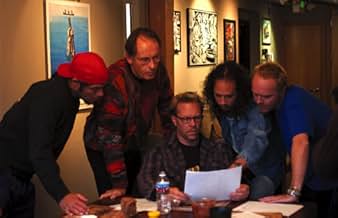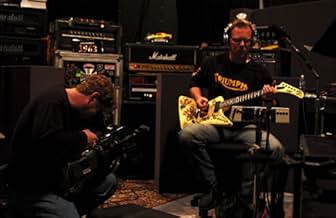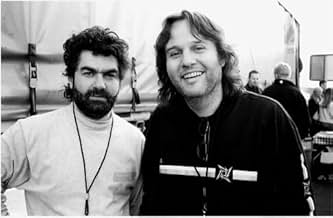Le groupe de métal emblématique se bat pendant deux ans pour créer son album St. Anger, traitant de l'alcoolisme, de la perte de leur bassiste et du défi de travailler avec un psychothérapeu... Tout lireLe groupe de métal emblématique se bat pendant deux ans pour créer son album St. Anger, traitant de l'alcoolisme, de la perte de leur bassiste et du défi de travailler avec un psychothérapeute.Le groupe de métal emblématique se bat pendant deux ans pour créer son album St. Anger, traitant de l'alcoolisme, de la perte de leur bassiste et du défi de travailler avec un psychothérapeute.
- Prix
- 6 victoires et 4 nominations au total
- Self
- (archive footage)
- Self
- (as Stefan Chirazi)
Avis en vedette
The film starts out unintentionally funny. They bring in the overpaid shrink who starts blathering on to the extent you expect Hetfield to stand up and tell him to get gone. But, no, Hetfield actually has an epiphany, thanks to 'Dr. Phil'. It's only at the end, if one sits through this thing, that you see 'Dr. Phil'. thinking of selling the homestead and moving to Bev-r-ley with that $40K a month paycheck (it's more than a lot a lawyers get), when Hetfield and Ulrich sort of cuss him out, tell him the gravy train is slowing down, and Hetfield dismissively leaves saying, Ah, let's play some music. But he still thanks the 'doc' later on. The whole thing is just sad to see. Even so, however comical his epiphany, getting off addiction is still very worthwhile. A shame it couldn't have been a little less embarrassing for Jim.
As good a guitarist a Kirk may be, this film makes him out to be not merely 'egoless', because he's clearly not, but practically effeminate. He seems more himself on his ranch. And he falls back into 'the wimp' role when he's with the band. Maybe if he just wore boots and a white Stetson he'd remember who he is a little better. I don't know.
Lars seems like some squirrely brat, most of the time. His father tells him not to settle. But Dad's in there bopping his head up and down to some truly awful tunes. The 'St. Anger' album was maybe the band's worst. But everyone was playing by the old rules, the old template, and thought there would be big money in this.
That's what they tell Trujillo, who actually had some life to his playing - for what one thinks of brain-dead Ozzy, he sure has picked his sidemen well. They give him the million up front. I wonder if he ever saw much more beyond that? They should have cashed him out for more than that! He harked back to the energy of Mustaine and Hetfield. Even Mustaine has the 'wimp factor' on his side, in this film, nowadays.
Did Metallica have to be toasted to play and compose like Metallica? Did they have to be 'monsters' to write Orion, or Master of Puppets? I don't agree. Or is that to argue that Trujillo is completely zonked in this film? I don't see that. I think the anger is real. I think the anger, the pettiness, particularly of Ulrich, is real in this film. I don't think it's put on. But the difference is that the style of metal is limited. And they don't want to try variations on the old themes, which is really the only way they'd maintain their success. They can't bring themselves to do that. And they don't want to become a folk, or pop band - or a jazz band.
So they play around in the Presidio, and goof in the studio, and have the greedy yes men saying that a least a few songs are outstanding (none were). But they want to try something new. And they've got nothing. They look like amateurs, not the band that released Nothing Else Matters, and so many others.
If they can't go back to the drawing board, if they just can't bring themselves to do that, or if there is just no longer any inspiration or nothing more to steal, then perhaps with a Trujillo they could openly recapture the first Garage Days effort where they cover 'Dope'head and Sabbath and others. They played Sabra Cadabra as well as Rhoades or Zakk. It was a great cover of that song. Some of the other covers were outstanding, even the Skynyrd stuff.
If they can't build on Puppets or Nothing Else or the rest, then maybe they could just re-establish themselves exclusively as a top cover band and cover Alice Cooper (as with the Humanary Stew album, arguably one of the best cover/tribute albums ever made). There's so much they could cover, so many bands and songs that may never otherwise really 'break through'. And then they wouldn't be so bored out of their minds that they might release another film such as this, even in the hope it might earn so much a cool million (after expensese, etc).
They'll be missed.
Joe Berlinger & Bruce Sinofsky are always there in time to catch the most important facial expressions, quotes and actions. The movie almost runs too perfectly, as if the whole thing had been scripted. The emotions of the band members and those around them seem so genuine, though, that it's hard to have any doubts about the movie's authenticity. It must have been a terrible stressing for the band - especially in a situation like this - to have cameras around them all the time. Throughout the whole movie you feel like you're in the room with one of the biggest rock bands on the planet and the cool thing is, that you really get a look behind the image, behind that Rock 'N' Roll dream. What you find are three guys that are just as unsure about themselves, their friendship and their career as everybody else is. Hetfield, Hammett and Ulrich try to be honest throughout the whole documentary and everybody comes across as a more or less normal person (Ulrich and his ego are more than just a bit annoying, though, and it's sad to see that the band still doesn't seem to have the tiniest bit of respect for their former bandmate Jason Newstedt, who had to put up with a lot of crap for almost 15 years). A whiny appearance by former band member/Megadeth frontman Dave Mustaine sticks out as the most moving/funniest moment. It really must suck to feel like he does, regretting everyday that you've been kicked out of one of the biggest bands on earth. Respect for such an honest statement in front of the cameras, though.
"Some Kind Of Monster" entertains for more than 120 minutes (and there's more on the DVD) without ever getting boring. The weird thing about this documentary is, that it's never about the music, but more about the process of a band recording itself. Whoever said that this one is a must see for Metallica fans, documentary fans and anyone in between got it right. It's more than your usual VH1 special. This one REALLY takes a look "behind the music" and a very exciting one at that.
Metallica's record company wanted the movie to accompany Metallica's 2003 release St. Anger as a weekly series of 30 minute reality TV to get the word out about the album. Metallica not only rejected that idea, but even decided to buy out the record company and release this a year later as a movie instead. We can only thank them for it.
This movie is certainly not a commercial for Metallica. We get to see the ugly side of Metallica. And it's ugly alright. We see Lars calling James a dick, shouting 'fuck' right in his face and getting drunk while selling his millions of dollars art collection. We see James yelling at Lars, slamming the door, checking in for rehab and after that demanding everyone to only work from 12 to 4. We see Kirk being a sissy the entire movie.
The title of the movie refers to James; he explains how Metallica has been a beast to him over the years. But Metallica has undoubtedly been a beast to others as well. Dave Mustaine is one of the most successful musicians in heavy metal with his band Megadeth, but apparently is still haunted by him being fired from Metallica. Nevertheless, the movie is ultimately about James' 'coming of age', changing from an angry alcoholic to a man who has managed to balance his personal life with the life in Metallica.
I have one beef with the movie. Around the end Lars says Metallica have proved that it's possible to make an angry record through positive energy. While I believe him when he says that, I do have to say I hardly saw any of that energy in the movie. In fact, it's a small miracle they managed to finish the album at all.
Even though not everyone is a fan of Metallica, I can recommend everyone to see this movie. See, this movie is not about the music. It's about people. People who struggle with themselves, with each other and with the outside world. It's also a unique look inside the workings (and non-workings) of a world class band and into the lifestyles of the rich and famous. This documentary is a landmark that upstages the album which creation it was originally supposed to document.
By engaging `performance-enhancement coach' Phil Towle for $40,000 a month, Metallica puts its money where its mouth is-a serious effort to preserve the magic of a group that sold 90 million albums, so much a product of delicate personality bonding that the full time therapist had a real challenge to preserve the indefinable chemistry. Beside Hetfield's demons, drummer Lars Ulrich's Napster battle takes energy from the group, so Towle is probably a small investment in its survival. If heavy metal is not your thing, seeing this group psychodrama would be worth the admission.
Not seeming to fit the overall clinical activity of the film is a scene of Ulrich selling his art collection. Critic Ed Gonzalez gives an insightful explanation:
`There's a moment in the film where Berlinger and Sinofsky force a fascinating correlation between the paintings that hang in Ulrich's home and the music the band makes, calling attention to the relationship between art and the spectator and the way that art is consumed. This scene has absolutely nothing to do with the psych sessions between Metallica and Towle, and it's a great one.'
This kind of organic unity makes it a documentary of artful proportions. I still prefer classical and folk music, but I have to admit to a new interest in a musical genre I can share with my musician grandson Cody.
The two words that best describe Some Kind of Monster are "brutally honest." This is a no-holds-barred look at a band that has played together for two decades and is on the verge of disintegration from internal conflict, external pressures and creative stagnation. We see the members of Metallica not as icons, but as flawed individuals in a close, but often tumultuous relationship that has lasted longer than many marriages. At a fundamental level the seem to love each other, but as with many long-term relationships, they sometimes reach the point that they cannot stand the sight of one another.
Can they survive? Well, the mystery is obviously abated by knowing how the story ends (the production of the album St. Anger and the subsequent tour); but it in no way detracts from this interesting examination of the process of separation and reconciliation.
Central to the story is not only tension the band members experience in once again trying to bottle the lightning of musical success, but the fundamental changes taking place in James Hetfield's life as he enters rehabilitation for drug and alcohol addiction. While Hetfield's personal battle takes place off-screen, we see the powerful impact it is having on the rest of the group.
Some truly standout moments include the interaction between Lars Ulrich and his father Torben (an amusing and brutally honest character); the long-delayed meeting between Lars and Dave Mustaine (who was kicked out of the band in the early 80s and went on to found Megadeath); a long band meeting which consists mainly of screaming obscenities; the band's search for a new bassist; and the almost surreal scene of Hetfield attending his daughter's ballet recital.
If you wish to see the members of Metallica as icons, then Some Kind of Monster is probably not for you; however, if you would like an up-close view of them as very real human beings, then I highly recommend this film. Love them or hate them, you will bring something away from Some Kind of Monster.
Le saviez-vous
- AnecdotesAll the footage for the film was comprised of 1600 hours of footage and was cut down to 2 Hours and 20 minutes.
- Citations
[Metallica is asked to record a radio promo]
Lars Ulrich: Hey it's Lars from Metallica. I'm about to stick 50 grand up your ass...
James Hetfield: ...One dollar at a time.
- ConnexionsEdited from MTV News (1989)
- Bandes originalesFrantic
Performed by Metallica
Written by James Hetfield (as Hetfield), Lars Ulrich (as Ulrich), Kirk Hammett (as Hammett),
Bob Rock (as Rock)
Courtesy of Elektra Entertainment Group
By Arrangement with Warner Strategic Marketing
Published by Creeping Death Music (ASCAP) and EMI Blackwood Music (Canada) Ltd./Mahina Hoku Publishing (SOCAN),
© 2003
Meilleurs choix
- How long is Metallica: Some Kind of Monster?Propulsé par Alexa
Détails
- Date de sortie
- Pays d’origine
- Site officiel
- Langue
- Aussi connu sous le nom de
- 金屬製品樂團:異種怪獸
- Lieux de tournage
- sociétés de production
- Consultez plus de crédits d'entreprise sur IMDbPro
Box-office
- Brut – États-Unis et Canada
- 1 222 708 $ US
- Fin de semaine d'ouverture – États-Unis et Canada
- 46 359 $ US
- 11 juill. 2004
- Brut – à l'échelle mondiale
- 1 980 444 $ US
- Durée2 heures 21 minutes
- Couleur
- Mixage
- Rapport de forme
- 1.33 : 1
Contribuer à cette page





























